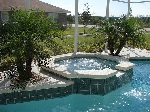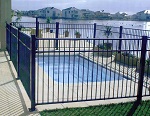 If you live in the Phoenix area, you are aware of the damage monsoon storms can cause. When a monsoon does hit, do you know the best way to care for your pool? In preparation for the monsoon season, here are some tips for taking care of your pool after a storm.
If you live in the Phoenix area, you are aware of the damage monsoon storms can cause. When a monsoon does hit, do you know the best way to care for your pool? In preparation for the monsoon season, here are some tips for taking care of your pool after a storm.
Before the Storm
• Cut the power. When a monsoon storm warning comes through, turn off the power to the swimming pool’s equipment, including the filter and pump. If a power surge happens from a lightning strike, it could serious damage or destroy your pool’s equipment.
• Invest in a pool cover. If you cover the pool, not just during a storm but all the time, it will prevent objects from blowing in including dirt and sand. Use a mesh cover since safety covers can fill with rain water and damage the pool.
• Secure anything that might blow into the pool. When a monsoon storm in approaching, you should secure anything that could possibly become airborne. It may not be feasible to prevent all forms of trash from landing in the pool, but it is possible to secure things such as patio furniture and umbrellas. If there is a warning of an impending storm, be sure to move them into the garage or some other covered area where they cannot take flight.
After the Storm
• Call your pool contractor. After a storm hits the area and you have made sure everyone is safe, your first call should be to whoever services your pool. Schedule a full cleaning and service to get your pool’s chemicals balanced. A pool contractor will also:
• Skim out the tree branches, leaves and other debris;
• Clean the skimmer baskets and pump strainer to keep it from getting blocked;
• Inspect the electrical equipment before the power is turned on in order to make sure that the pump is working;
• Vacuum the pool; and
• Shock the pool and balance the chemicals.
A swimming pool is a huge investment that you want to protect. Taking the time to prepare for monsoon season will allow you to rest easy when a storm hits.


 Pools are a great addition to any home and a wonderful way to bring families together for fun activities. But one of the fears of any homeowner with a pool is the possible dangers associated with water safety. That is why it is important to look at a variety of pool safety tips and to institute a plan for maintaining a safe and orderly area around and in your pool.
Pools are a great addition to any home and a wonderful way to bring families together for fun activities. But one of the fears of any homeowner with a pool is the possible dangers associated with water safety. That is why it is important to look at a variety of pool safety tips and to institute a plan for maintaining a safe and orderly area around and in your pool.